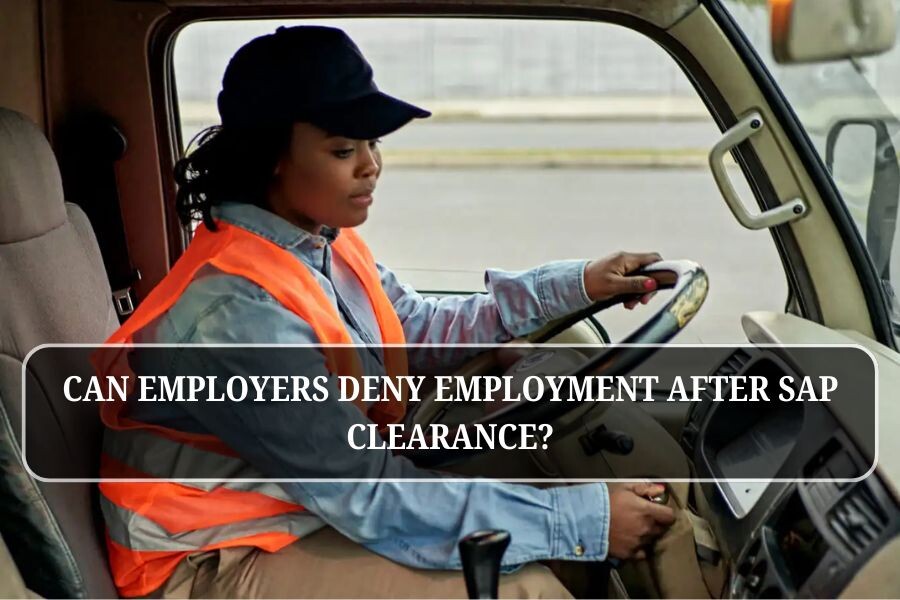Introduction
After completing a Substance Abuse Professional (SAP Evaluation) program, many CDL drivers believe they are fully cleared to return to work. But here’s the big question: Can employers deny employment after SAP clearance? The short answer is yes, they can in some cases—but within legal boundaries.
In this blog, we’ll break down the legal rights of employers, the DOT rules that protect drivers, and what CDL holders can expect after finishing the Return-to-Duty (RTD) process.
What Does SAP Clearance Mean?
When a CDL driver fails or refuses a DOT drug/alcohol test, they must:
- Undergo a SAP evaluation
- Complete education or treatment
- Pass a Return-to-Duty test
- Comply with follow-up testing
Once all steps are completed, the driver is officially SAP-cleared and eligible to return to safety-sensitive duties.
Learn: What Happens After a DOT SAP Evaluation? The Full Return-to-Duty Timeline
Can Employers Deny Employment After SAP Clearance?
The answer depends on a mix of DOT regulations, FMCSA Clearinghouse rules, and employer policies.
- DOT Regulations: The DOT requires employers to honor SAP clearance when determining if a driver is eligible to perform safety-sensitive functions.
- Employer Discretion: While drivers are eligible, employers are not legally obligated to hire them. They can deny employment based on company policy, insurance requirements, or risk management considerations.
- Clearinghouse Transparency: The violation and SAP completion will still be visible in the FMCSA Clearinghouse for five years or longer if follow-up testing isn’t finished. Employers see this history during hiring.
Legal Boundaries Employers Must Follow
While employers have discretion, they must operate within legal limits:
No Discrimination: Denying employment must not violate EEOC (Equal Employment Opportunity Commission) protections, such as discrimination based on race, age, gender, or disability.
Compliance With DOT Rules: Employers cannot allow a driver to operate commercially without SAP clearance—but denying employment even after clearance is permitted.
State Laws: Some states have additional worker protections that limit employment denial based solely on past drug/alcohol violations.
EEOC Guidance on Employment Discrimination
Why Do Employers Still Deny Employment After SAP Clearance?
Even with clearance, CDL drivers may face job rejections due to:
Company Insurance Policies – Some insurers won’t cover drivers with past violations.
Company Reputation & Liability Concerns – Employers may choose a risk-free approach.
Driver Shortages vs. Company Policy – Some companies are more open to SAP-cleared drivers when demand for CDL drivers is high.
Read: Hiring CDL Drivers After a Violation – Can Employers Trust SAP-Cleared Employees?
What CDL Drivers Can Do After SAP Clearance
Highlight SAP Completion – Show employers you followed through with compliance.
Apply to SAP-Friendly Employers – Some carriers openly hire SAP-cleared drivers.
Maintain a Clean Record – Continued negative drug/alcohol tests build trust with employers.
Stay Persistent – Each year, more employers are willing to give SAP-cleared drivers another chance.
Conclusion
So, Can Employers Deny Employment After SAP Clearance? Yes—but within legal boundaries. While DOT regulations make you eligible to work again, employers can still deny employment based on policy, insurance, or risk management. The good news is that many companies do hire SAP-cleared drivers, especially when they demonstrate long-term compliance.
If you’ve recently completed your SAP process, don’t give up. The key is to stay compliant, persistent, and connected with employers open to second-chance hiring.
Contact AACS Counseling to Start or Complete Your SAP Evaluation
